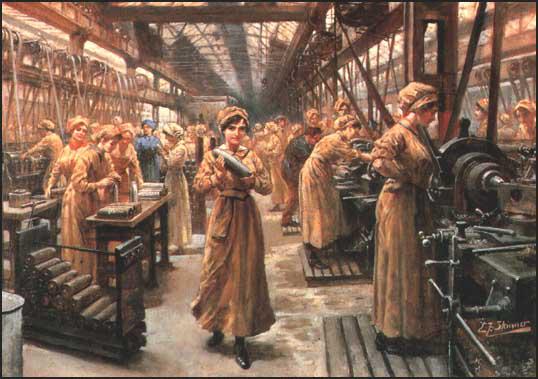Munitions
On 4th August, 1914, England declared war on Germany. The role of women changed dramatically during the First World War. As men left jobs to fight overseas, they were replaced by women.
Women filled many jobs brought into existence by wartime needs. As a result the number of women employed increased from 3,224,600 in July, 1914 to 4,814,600 in January 1918. Nearly 200,000 women were employed in government departments. Half a million became clerical workers in private offices. Women worked as conductors on trams and buses. A quarter of a million worked on the land. The greatest increase of women workers was in engineering. Over 700,000 of these women worked in the highly dangerous munitions industry.

Primary Sources
(1) David Lloyd George, wrote about his work as Minister of Munitions in his book War Memoirs (1938)
I had some insight before then into the position of things, but what I have seen has convinced me from overwhelming testimony that the nation has not yet concentrated one half of its industrial strength on the problem of carrying this great conflict through successfully. It is a war of munitions. We are fighting against the best-organised community in the world; the best-organised whether for war or peace, and we have been employing too much the haphazard, leisurely, go-as-you-please methods, which, believe me, would not have enabled us to maintain our place as a nation, even in peace, very much longer.
The nation now needs all the machinery that is capable of being used for turning out munitions or equipment, all the skill that is available for that purpose, all the industry, all the labour, and all the strength, power, and resource of everyone to the utmost, everything that would help us to overcome our difficulty and supply our shortages. We want to mobilise in such a way as to produce in the shortest space of time the greatest quantity of the best and most efficient war material. That means victory; it means a great saving of national strength and resources, for it shortens the War; it means an enormous saving of life.
The making of a gun or shell-case, for instance, involves the metal trades, blast-furnaces, steel works, iron and steel foundries, forges, stamps, drops and dies, rolling-mills, drawn rod and wire works - and behind them, the colliery and the iron-ore quarry.
It requires factories, and these in turn require machinery, covered electrical plant, factory equipment and machine tools; engines, pumps, turbines, road and rail transport; boiler-making and constructional engineering work.
The explosives for filling and propelling the shell from the gun involve the output of chemical works, dye works, gas works, and a great deal of very careful laboratory experiment, investigation and testing.
Small arms and ammunition, and all the miscellaneous stores used in trench virtual agreement upon the reasonable course of economic development. It is a development towards nationalization; so far we go with the Socialist, but it is a development not by the Socialist's panacea of 'appropriation' at all, but by amalgamation, by co-ordination and cooperation, and by bringing the State into partnership, and an increasing partnership, in the big businesses that result from these amalgamations, by developing the crude beginnings of the "controlled establishment", by the quid pro quo of profit-sharing and control in the national interest in exchange for the national credit and a helpful tariff.
It is not one of the least of the compensations for this war that it has necessitated experiments upon an otherwise impossible scale in the handling and rationing of the people's food and drink, and upon the conversion of private into quasi-public businesses.
